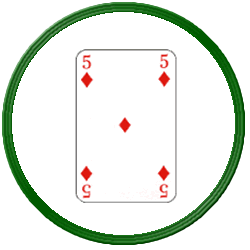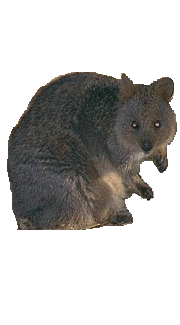|
     
Download
Generic Card System here
The rules are in pdf format. To read
them you'll need Adobe Acrobat Reader. The latest version of Acrobat
Reader is available from here for FREE :

|
  
Designed
by : Oreon Dimitrios
The
Generic Card System is a simple way to start a role playing session.
All you need is a deck of ordinary playing cards, pencil, paper,
and a bit of imagination.
Download
the rules (1 page) in pdf form or check out the version below.
Generic
Card System
All actions that require a random element (including
combat) can be resolved with these simple rules. All actions
are resisted, either skill vs difficulty (0-5) or one
person against another.
- Both sides draw cards equal to their skill (difficulty).
- Then they add up face values of the red cards (offensive)
and the black cards (defensive). Offensive values are
compared against opponent's defensive values.
- If a sides red value is higher than opponents black,
the action is successful.If both sides have higher red
than black values then both sides succeed. Where one side
is a difficulty level and it scores a success something
bad happens (though does not necessarily cause damage)
If both sides have higher black then action is nullified.
- The higher the value the more successful/ more damage.
If a value of success is required (eg. damage) it is the
difference in value between successful red and opponents
black scores.
Special cards
Numbered cards are just their face value. Picture cards
are Jakes-11, Queens-12, and Kings-13. Aces are automatic
successes and nullify all opponent's cards. They are
only stoped by another Ace of opposite colour. After
their effect remove them from hand. Jokers are wild
cards. When one is drawn something unexpected happens,
GMs discretion. (eg. lighting strikes an opponent)
Combat rules
Missile combat is the same as the norm except that
damage can not be done to attacker unless they are both
engaged in missile combat. If defender gets a high red
score he may however complete an action of his choice
(to be decided before cards drawn) eg. Grog
throws his sword at Trog, Trog says his action will
be to catch the sword. If Grog is successful or not
(has higher red score than Trogs black) Trog can catch
the sword if his red score is higher than Grog's black.
Multiple Opponents. Scores can be divided between and
added together for group attacks. This can be done after
cards are drawn.
Skills and Abilities
Each character has 4 attributes Power, Nimbleness,
Charm and Smarts. These are ranked 1-3. 1-poor 2-average
3-good Skills are also ranked between 1-3, though they
may increase at GMs discretion. If you do not have a
skill you are ranked as 0 but may still attempt a task
by using the most appropriate ability. When testing
a skill (including combat) simply add the most relevant
ability to your skill and that is the number of cards
to draw.
Magic
Works the same as all other skills except you must
have the appropriate skills. To cast magic you need
an area skill and an ability skill. The more complex
the task, the more skills required. Eg. To start a fire
you simply need fire and create but to hurl a fireball
you also need control. The GM decides the difficulty.
This is decided by starting with a base difficulty (1-5)
then adding cards for every extra skill needed.
|
Number of skill cards used
|
Extra difficulty cards
|
|
2
|
1
|
|
3
|
(1+2) 3
|
|
4
|
(1+2+3) 6
|
|
5
|
(1+2+3+4) 10
|
|
6
|
(1+2+3+4+5) 15 (etc..)
|
Difficulty is also increased by the frequency of use,
so for every time magic is used without a rest period
(GMs discretion as to what is a rest period) an extra
card is added. These skills are:
|
Area
|
Earth |
Wind |
Fire |
Water |
Religious (gods, spirits, undead etc..) |
People |
| Ability |
Create (out of thin air) |
Control |
Protection |
Summon (if already exists) |
Understand |
Character Creation
Each player has 8 points to spread between his Abilities
and 4-15 points to spend on skills depending on eduction/experience.
Skills are any agreed upon activity that the GM and player
decide. eg. A player decides during making his character
that he should be able to seduce people and the GM agrees.
He then adds this to his skill list and spends the points
on it. Anything that a player thinks he should be
able to do that's out of the ordinary can be a skill.
The player must be able to explain in general what the
skill involves. This is very important for magic. Possible
skills are:
| Unarmed combat |
Armed Combat |
Missile Combat |
| Ride |
Pick Locks |
Stealth |
| Invent |
Read |
Cook |
| Swim |
Tennis |
Critique Movies |
| Juggle |
Speak Swahili |
Projectile Vomit |
Life points are determined by drawing the number of
cards equal to your highest physical ability and adding
up total face values. Fill in wanted background and give
him/her a name.
Growth
There are no experience points. Simply when a player
can argue that a skill or ability should increase and
the GM agrees then it goes up.
Bonuses and Penalties
Whether its terrain, a magic potion, or good lighting,
+/- simply work along these lines. If it is a general
+/- then you either add or subtract cards (usually between
1-3) eg. you have taken a speed potion which gives
you an extra card in combat/athletics If it is a particular
+/- then it is either added to your red/black score (usually
between 1-5). eg. you have terrific amour, you get
a + 5 to your black score in combat. All bonuses and
penalties are at the GMs discretion.
|
Return to the top of the page
|

